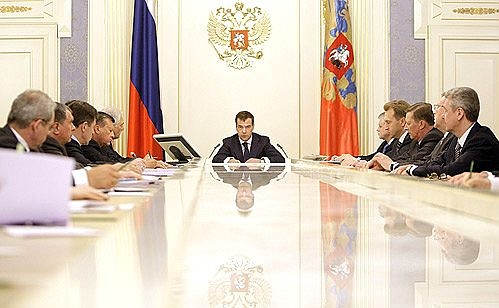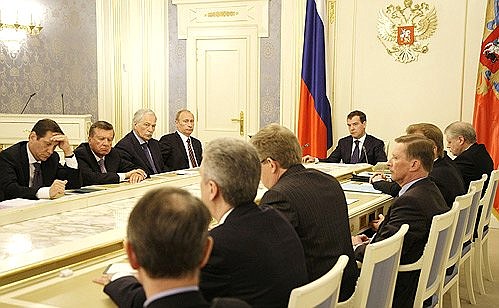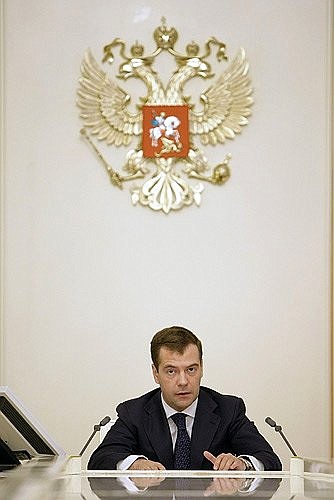The President outlined a list of the main budget policy priorities for 2010–2012, including:
- fulfil social spending commitments and make them more targeted in nature;
- consistent efforts to reduce the budget deficit and raise the level of undistributed reserves in order to be able to make flexible responses to changes in the economic situation;
- stringent cost-cutting measures to save budget money;
- look for optimum means for supporting the country’s manufacturing and industrial sectors and financial system;
- achieve a radical improvement in the quality of public healthcare, education, and other services, including through ongoing implementation of the priority national projects;
- improve the public procurement system in such a way as to encourage technological modernisation and make manufacturers more effective and competitive;
- set an economically justified tax burden;
- make the authorities at every level of government responsible for spending budget funds effectively;
- complete work on establishing a balanced and reliable pension system;
- establish a support system for people with disabilities in line with the International Convention on the Rights of Persons with Disabilities.
The budget address states that a significant fall in Russia’s GDP is expected in 2009, and budget spending will exceed revenue for the first time in the last ten years. The federal budget deficit will come to at least 7 percent of GDP.
The document notes that the crisis teaches the country lessons for preventing in the future such upheavals for the Russian economy. Budget planning should be based on conservative forecasts for raw materials prices; there must be a policy of keeping public spending in check; anti-crisis measures should not be implemented to the detriment of long-term priorities; maintaining macroeconomic stability is a fundamental condition for sustainable economic development.
The budget address gives the main outlines of tax policy, which needs to focus on two main tasks: modernising the country’s economy and ensuring the required level of budget revenue. The document states that work will continue in 2009–2011 to optimise the tax system, and it also presents the main areas of this work and specific measures to be undertaken.
It also presents measures to support investment activity, expand research and development and innovation activity, and make businesses more energy efficient.
Special measures are planned to ensure stable budget revenue and fight tax evasion.
The budget address defines the main budget spending priorities. It proposes the following approaches in different areas of government policy:
- financial provision for pension reform;
- guaranteed fulfilment of social spending commitments;
- development of projects with a long-term reach (including in housing construction, education and healthcare);
- efforts to encourage progressive structural change in the economy;
- justification and transparency of government support for manufacturing and industrial sector enterprises;
- stabilisation on the job market;
- financial provision for modernisation of the Armed Forces;
- financial provision for the Russian Federation’s fulfilment of its international obligations (including development assistance for the poorest countries and funds for the organisation of big international events such as the APEC summit in Vladivostok in 2012, the World University Games in Kazan in 2013, and the Sochi Winter Olympics in 2014).
Separate sections of the budget address deal with policy on inter-budget relations in the Russian Federation and improving the way the budget is formed and executed.
Future budget planning will be based on the targeted programme approach. Long-term targeted programmes will form the foundation for budget planning, thus making it possible to define spending priorities, goals and results more clearly, set the indicators for measuring these results, and organise ongoing monitoring of the effectiveness of budget spending.
In a change of established procedure, Mr Medvedev personally presented the budget address to the Government. Previously, the budget address was sent as a written document to the Government and the State Duma.
The meeting was attended by the Government members, headed by Prime Minister Vladimir Putin, and the speakers of the Federal Assembly’s upper and lower houses, Chairman of the Federation Council Sergei Mironov, and Chairman of the State Duma Boris Gryzlov.


